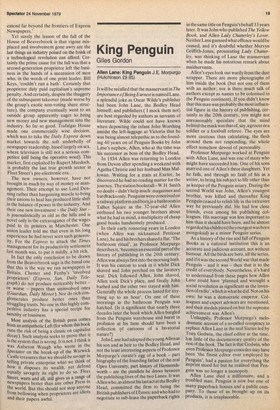King Penguin
Giles Gordon
Allen Lane: King Penguin J.E. Morpurgo (Hutchinson 03.95) It will be reealled that the manservant in The Importance o f Being Earnest is named Lane, a splendid joke as Oscar Wilde's publisher had been John Lane, the Bodley Head himself; and publishers ( I mock them not) are best regarded by authors as servants of literature. Wilde could not have known when depositing the infant John Worthing amidst the left-luggage at Victoria that he was being almost telepathic as to the founding 40 years on of Penguin Books by John Lane's nephew, Allen, who at the time was his successor as boss of the Bodley Head.
In 1934 Allen was returning to London from Devon after spending a weekend with Agatha Christie and her husband Max MalIowan. Waiting for a train at Exeter, he discovered he had no reading matter for the journey. The station bookstall—W.H. Smith no doubt — didn't help much: magazines and h ardbacksonly. Penguins were conceived on a railway platform and born in a bathroom in Talbot Square as the 32-year-old Allen enthused his two younger brothers about what he had in mind, a multiplicity of cheap good books handsomely produced.
In their early roistering years in London (when Allen was nicknamed Petticoat Lane), he and his brothers shared a flat. 'The bathroom ritual', as Professor Morpurgo describes it, 'becomes an essential part of the history of publishing in the 20th century. Allen was always first into the morning bath. It was his custom to soak in it whilst Dick shaved and John perched on the lavatory seat. Dick followed Allen, John shaved, Allen took Dick's place, and finally John bathed and the other two stayed with him. Generally the whole process lasted for anything up to an hour'. On one of these mornings in the bathroom Penguin was hatched. (Is it significant that nearly three decades later the book which Allen burgled from the Penguin warehouse and burnt in profusion at his farm should have been a collection of cartoons of a lavatorial nature?) John Lane had adopted the young Allen as his son and as heir to the Bodley Head, and not the least interesting aspects of Professor Morpurgo's curate's egg of a book — part biography of the founding father of the real Open University, part history of Harmondsworth — are the parallels he draws between the publishing lives of the two Lanes. It was Allen w ho, as almost his last act at the Bodley Head, committed the firm to being the British publishers of Ulysses; and who had to negotiate to sub-lease the paperback rights in the same title on Penguin's behalf 33 years later. It was John who published The Yellow Book, and Allen Lady Chatterley's Lover. Neither Lane guessed what offence wouldbe caused, and it's doubtful whether Mervyn Griffith-Jones, prosecuting Lady Chatterley, was thinking of Lane the manservant when he made his notorious remark about maidservants.
Allen's eyes look out warily from the dust wrapper. There are more photographs of him inside the book (but not one of them with an author; nor is there much talk of authors except as names to be colonised in the Penguin continent). If you didn't know that this man was probably the most influential figure in the history of publishing, certainly in the 20th century, you might not unreasonably speculate that the mind behind the mask was that of, say, agrocer or a soldier or a football referee. The eyes are more cautious than calculating, the flesh around them not responding, the whole effect somehow devoid of personality.
Professor Morpurgo worked at Penguin with Allen Lane, and was one of many who might have succeeded him, One of his sons married one of Alien's three daughters. Yet he fails, and through no fault of his as a writer, to bring his subject to life other than as keeper of the Penguin aviary. During the second World war John, Allen's youngest brother, was killed and thereafter King Penguin ceased to relish life in the extravert way he previously did. He had few close friends, even among his publishing colleagues. His marriage was less important to him than it should have been, and he almost regarded his children (the youngest was born mongoloid) as a minor Penguin series.
As a history of the rise and fall of Penguin Books as a national institution this is an accurate and judicious account, not without humour. All the birds are here, all the series, and if it was the second World war that made Penguin — and it was — then that is to the credit of everybody. Nevertheless, it's hard to understand from these pages how Allen Lane could have 'planned and wrought a social revolution as significant as the invention of radio', which is what he did. Not on his own: he was a democratic emperor. Colleagues and expert advisors are mentioned, and their medals pinned on but the supreme achievement was Allen's .
Unhappily, Professor Morpurgo's melodramatic account of a so-called conspiracy to replace Allen Lane in the mid Sixties led by Tony Godwin, the chief editor at the time, has little of the documentary quality of the rest of the book. The fact is that Godwin, who even Professor Morpurgo concedes may have been 'the finest editor ever employed by Penguin', had a passion for everything the imprint stood for but he realised that Penguin was no longer a monopoly. Allen Lane died a millionaire, and a troubled man. Penguin is now but one of many paperback houses and a public company. To those of us brought up on its products, it is irreplaceable.


































 Previous page
Previous page